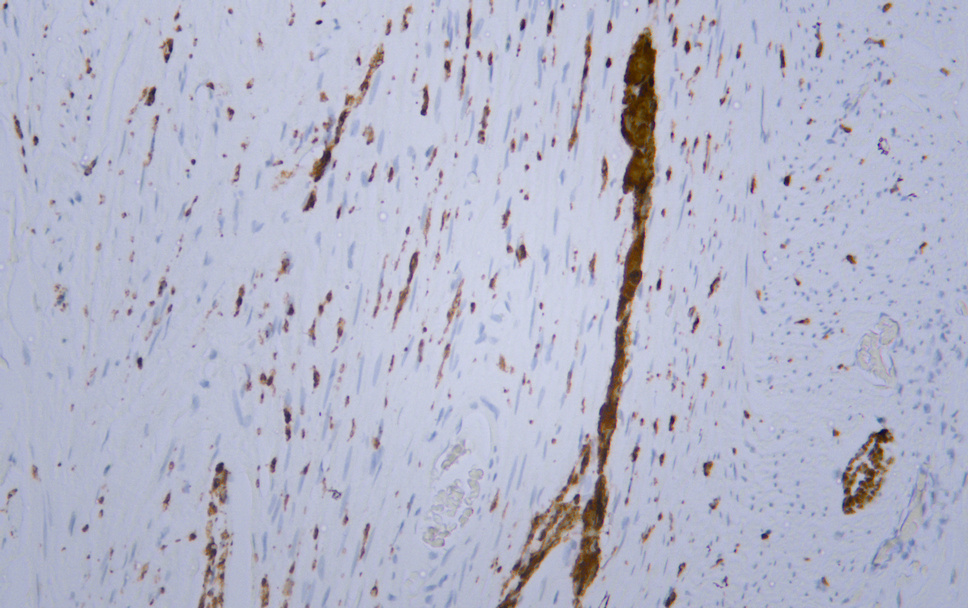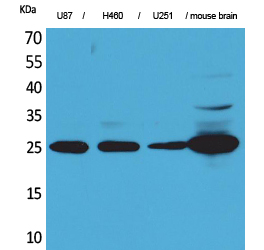Total UCH-L1 Cell-Based Colorimetric ELISA Kit
- Catalog No.:KA3360C
- Applications:ELISA
- Reactivity:Human;Mouse;Rat
- Gene Name:
- UCHL1
- Human Gene Id:
- 7345
- Human Swiss Prot No:
- P09936
- Mouse Swiss Prot No:
- Q9R0P9
- Rat Swiss Prot No:
- Q00981
- Storage Stability:
- 2-8°C/6 months
- Other Name:
- Ubiquitin carboxyl-terminal hydrolase isozyme L1 (UCH-L1) (EC 3.4.19.12) (EC 6.-.-.-) (Neuron cytoplasmic protein 9.5) (PGP 9.5) (PGP9.5) (Ubiquitin thioesterase L1)
- Detection Method:
- Colorimetric
- Background:
- catalytic activity:Thiol-dependent hydrolysis of ester, thioester, amide, peptide and isopeptide bonds formed by the C-terminal Gly of ubiquitin (a 76-residue protein attached to proteins as an intracellular targeting signal).,disease:Oxidation of Met-1, Met-6, Met-12, Met-124 and Met-179 to methionine sulfoxide, and oxidation of Cys-220 to cysteine sulfonic acid have been observed in brains from Alzheimer disease (AD) and Parkinson disease (PD) patients. In AD, UCHL1 was found to be associated with neurofibrillary tangles.,function:Ubiquitin-protein hydrolase involved both in the processing of ubiquitin precursors and of ubiquitinated proteins. This enzyme is a thiol protease that recognizes and hydrolyzes a peptide bond at the C-terminal glycine of ubiquitin. Also binds to free monoubiquitin and may prevent its degradation in lysosomes. The homodimer may have ATP-independent ubiquitin ligase activity.,miscellaneous:In contrast to UCHL3, does not hydrolyze a peptide bond at the C-terminal glycine of NEDD8.,online information:Ubiquitin carboxy-terminal hydrolase L1 entry,PTM:O-glycosylated.,similarity:Belongs to the peptidase C12 family.,subunit:Homodimer. Interacts with SNCA (By similarity). Interacts with COPS5.,tissue specificity:Found in neuronal cell bodies and processes throughout the neocortex (at protein level). Expressed in neurons and cells of the diffuse neuroendocrine system and their tumors. Weakly expressed in ovary.,
- Function:
- cell morphogenesis, cell morphogenesis involved in differentiation, proteolysis, ubiquitin-dependent protein catabolic process, microtubule-based process, microtubule-based movement, axonogenesis, axon target recognition, behavior,locomotory behavior, adult walking behavior, feeding behavior, axon cargo transport, cell proliferation, adult locomotory behavior, macromolecule catabolic process, microtubule-based transport, protein deubiquitination, axon transport of mitochondrion, modification-dependent protein catabolic process, cell projection organization, protein catabolic process, neuron differentiation, adult behavior, cytoskeleton-dependent intracellular transport, neuron projection development, cellular component morphogenesis, cell part morphogenesis, eating behavior, modification-dependent macromolecule catabolic process, cellular protein catabolic process, cellular macromolecule
- Subcellular Location:
- Cytoplasm . Endoplasmic reticulum membrane ; Lipid-anchor . About 30% of total UCHL1 is associated with membranes in brain.
- Expression:
- Found in neuronal cell bodies and processes throughout the neocortex (at protein level). Expressed in neurons and cells of the diffuse neuroendocrine system and their tumors. Weakly expressed in ovary. Down-regulated in brains from Parkinson disease and Alzheimer disease patients.
- June 19-2018
- WESTERN IMMUNOBLOTTING PROTOCOL
- June 19-2018
- IMMUNOHISTOCHEMISTRY-PARAFFIN PROTOCOL
- June 19-2018
- IMMUNOFLUORESCENCE PROTOCOL
- September 08-2020
- FLOW-CYTOMEYRT-PROTOCOL
- May 20-2022
- Cell-Based ELISA│解您多样本WB检测之困扰
- July 13-2018
- CELL-BASED-ELISA-PROTOCOL-FOR-ACETYL-PROTEIN
- July 13-2018
- CELL-BASED-ELISA-PROTOCOL-FOR-PHOSPHO-PROTEIN
- July 13-2018
- Antibody-FAQs


